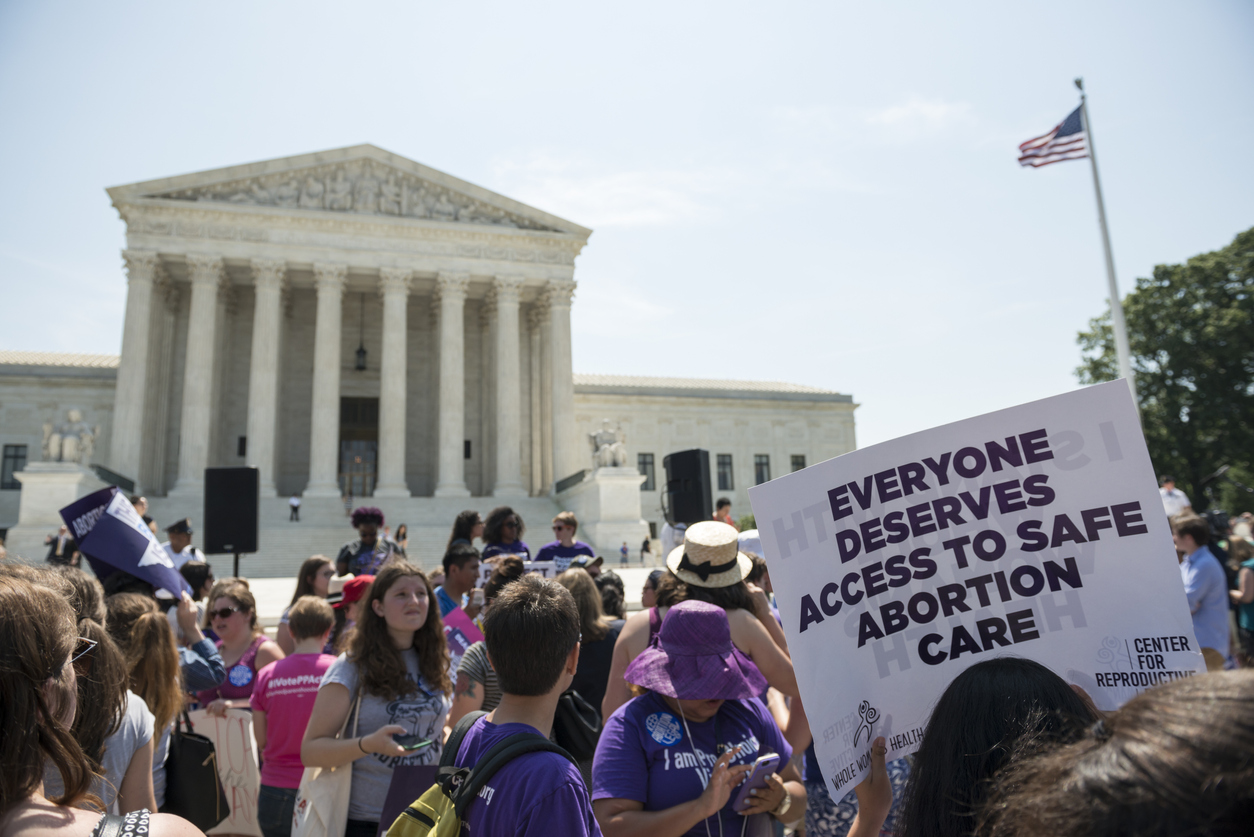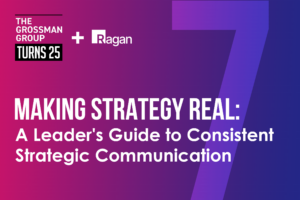How companies are succeeding – or failing – at supporting employees on abortion rights
From offering travel assistance as a reproductive health right to bailing out protestors, organizations are demonstrating a wide range of support for workers after Roe v. Wade.

The Supreme Court’s historic reversal of Roe v. Wade was formally decided Friday. Of course, this decision, which affects millions of American women by allowing states to deny them safe abortion access, has not gone away. Thousands marched in cities across the country, reproductive health and advocacy organizations galvanized their communities and amped up their messaging to assist those most vulnerable, while pro-choice vowed to keep fighting.
Since a draft of the decision was leaked in May, several organizations issued proactive plans and polices for employees. Others were quick to announce their internal policies externally as mixternal affirmations of their purpose and values, a sure sign that internal discussions had been ongoing for the past month and a half.
“As the world’s most broadly-based health care company, we strive to improve access and affordability, create healthier communities, and put health within reach for the people we serve,” Johnson & Johnson said Friday. “We also believe health care decisions are best determined by individuals in consultation with their health care provider.”
Levi Strauss & Co. called on business leaders to take a stand against the ruling. “Protection of reproductive rights is a critical business issue impacting our work force, our economy and progress toward gender and racial equity,” the company said. “Given what is at stake, business leaders need to make their voices heard.”
A look at the wide range of corporate responses and employee communications offers insight into the litany of ways that organizations can aid their workforce — or leave employees feeling unsupported — during an unprecedented time.
Covering travel costs
Many organizations large and small announced that they would support employees’ right to access comprehensive reproductive healthcare, including abortion, by covering the financial costs for employees who need to travel for safe, legal access. JPMorgan Chase was among the largest employers to announce this benefit, sharing the news as part of an internal memo announcing expanded medical benefits:
“Effective in July, you will be able to access additional covered benefits under the U.S. Medical Plan,” the New York-based bank told workers. Those changes include “family-building benefits, such as cryopreservation,” and enhanced benefits for LGBT+ workers, the bank said.
“We will also expand our existing health care travel benefit, which today covers certain services such as organ transplants, to all covered health care services that can only be obtained far from your home,” JPMorgan told its staff.
Though JPMorgan sent the memo on June 1, it kept the communication with employees going by linking an employee question-and-answer page to the memo. It was there where the bank directly answered the question of abortion access:
“Will you pay for an employee to travel to another state to seek an abortion if their state won’t allow them to get one?” the bank said.
“Yes. Our health care plans have historically covered travel benefits for certain covered services that would require travel,” JPMorgan said. “Beginning in July, we will expand this benefit to include all covered services that can only be obtained far from your home, which would include legal abortion.”
DICK’s Sporting Goods president and CEO Lauren Hobart announced the company would adopt a similar policy, acknowledging that the decision might not be universally lauded by some employees who share different political and ideological values.
“We recognize people feel passionately about this topic — and that there are teammates and athletes who will not agree with this decision,” she wrote on LinkedIn. “However, we also recognize that decisions involving health and families are deeply personal and made with thoughtful consideration. We are making this decision so our teammates can access the same health care options, regardless of where they live, and choose what is best for them.”
Disney offered a similar employee benefit framed as “family planning,” and said it would extend to any worker who cannot access care where they live.
“We have communicated directly with our employees today that we recognize the impact of the ruling and that we remain committed to providing comprehensive access to quality and affordable care for all of our employees, cast members and their families, including family planning and reproductive care, no matter where they live,” Disney said in a statement to The Washington Post.
Arriving months after Disney was criticized by employees for its response to Florida’s nicknamed “Don’t Say Gay” bill, the company’s choice to offer employees support on a politically polarizing issue amounts to a lesson learned. It also acts as a commitment to employees over politics during a time when the company’s ideological and political values are scrutinized by Republican lawmakers in Florida, where Walt Disney World resides and the company employs about 80,000 people.
Other companies including Adidas, Lyft and several media brands have similarly expanded their employee benefits to cover travel costs for reproductive health, deftly framing the issue as a right to health care and working within their existing benefits frameworks.
Bailing out protestors
Some companies went further, saying that they would pay bail for employees who are arrested while peacefully protesting.
Live Nation announced this policy and reinforced its support for community activism through an Instagram post:
View this post on Instagram
Patagonia reiterated a similar bail policy, explaining that its policy was not actually new.
Patagonia spokesperson J.J. Huggins told Axios the company has “had the bail policy in place for many years.”
“The company will post bail for an employee who has previously taken a nonviolent civil disobedience class and is subsequently arrested while peacefully protesting,” he said.
Offering to bail out employee protestors conveys these organizations take a more openly progressive stand on the issue, one that amounts to a calculated risk as both brands demonstrate an understanding of their employee and customer bases. While bailing out protesting workers is not the right decision for all (or even most) organizations to make, the bold and affirming nature of such a stand can deepen employee trust and create a deeper level of brand advocacy through its emphasis of shared values.
Censoring internal dialogue
While most of the aforementioned companies have earned purposeful reputational wins by announcing new policies, Meta took heat for telling workers that they could not openly discuss the ruling on company-wide communications channels.
Managers at Meta, which owns Facebook and Instagram, cited a company policy that put “strong guardrails around social, political and sensitive conversations” in the workplace, said the people, who spoke on the condition of anonymity. They said managers had pointed employees to a May 12 company memo, which was issued after a draft opinion on potentially overturning Roe v. Wade was leaked from the Supreme Court.
In the May 12 memo, which was obtained by The New York Times, Meta said that “discussing abortion openly at work has a heightened risk of creating a hostile work environment,” so it had taken “the position that we would not allow open discussion.”
The policy has led to frustration and anger, the people said. On Friday, some contacted colleagues and managers to express their dissent with the company’s stance. Managers were advised to be empathetic but neutral on the topic, while messages that violated the policy in team chats were removed, two people said. In the past, Meta employees often used internal communication forums to discuss sociopolitical issues and current events.
Meta software engineer Ambros Vaes voiced his sadness with the decision in a LinkedIn post. “The ‘respectful’ communications policy that was put in place explicitly disallows it,” he wrote. “Limited discussion can only happen in groups of up to 20 employees who follow a set playbook, but not out in the open. Sheryl Sandberg posted on her Facebook account about what happened today, and even links to her post are removed, out of fear of offending the few employees who might actually agree with the insanity that is going on.”
While the company’s attempts to contain any sensitive internal discussions make sense following the company’s widespread leaks during this past fall’s editorial expose in the Wall Street Journal, failing to give employees a structured space to air their grievances seems to have only made matters worse.
How has your organization responded, or planned its response, to the overturning of Roe v. Wade? Drop me a line – jusitnj@ragan.com , and let me know.








.png)